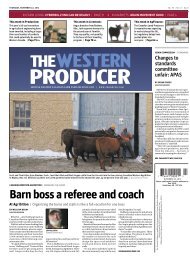You also want an ePaper? Increase the reach of your titles
YUMPU automatically turns print PDFs into web optimized ePapers that Google loves.
WHOA, BACK OFF THERE, MR. ED<br />
NEWS<br />
Equine meets canine at the Watkins farm near Aylesbury, Sask. <strong>The</strong> family Black Labrador Retriever tolerates the horses as long as they keep<br />
their distance. | MICKEY WATKINS PHOTO<br />
MANITOBA DAIRY CONFERENCE | SUPPLY MANAGEMENT<br />
New Zealand is enemy No. 1: historian<br />
Dairy’s biggest enemy | New Zealand campaigns against Canada’s supply management system<br />
BY ED WHITE<br />
WINNIPEG BUREAU<br />
Supply management is an<br />
“incredible” system in almost every<br />
way, but it is threatened by forces<br />
like New Zealand, historian Bruce<br />
Muirhead told an appreciative<br />
crowd at the Manitoba Dairy Conference.<br />
Muirhead, a University of Waterloo<br />
professor, condemned the<br />
modern world’s embrace of neoliberalism<br />
and painted a picture of<br />
hypocritical foreign countries subsidizing<br />
their own dairy industries<br />
while claiming to want free trade.<br />
“Why is it they’re so opposed to<br />
what we are doing,” said Muirhead,<br />
who noted agricultural production<br />
is only a small part of most countries’<br />
economies and a tiny part of<br />
economies in advanced countries.<br />
“Ideology comes down, I think, to<br />
a good part of the reason as to why<br />
the OECD (Organization for Economic<br />
Co-operation and Development)<br />
and the WTO (World Trade<br />
Organization) and certain other<br />
governments are opposed to Canada’s<br />
supply management system,”<br />
he said.<br />
Muirhead said supply management<br />
was a product of an age in<br />
which government-based economic<br />
arrangements were seen as<br />
part of the solution to problems,<br />
while now many societies see government<br />
as more of a problem.<br />
Supply management is under<br />
Bruce Muirhead of the University of Waterloo denounced New Zealand<br />
as the Canadian dairy industry’s “enemy” during the Manitoba Dairy<br />
Conference. | ED WHITE PHOTO<br />
intense scrutiny around the world,<br />
especially because Canada is trying<br />
to negotiate a trade deal with the<br />
European Union and has begun its<br />
negotiations for the Trans Pacific<br />
Partnership.<br />
Muirhead said Europe has<br />
shown signs of allowing Canadian<br />
supply management to survive as<br />
long as Canada ditches its<br />
favourable arrangements for<br />
generic drug makers.<br />
However he doubts the TPP, driven<br />
by free trade advocate New Zealand,<br />
will be as willing to compromise.<br />
THE WESTERN PRODUCER | WWW.PRODUCER.COM | DECEMBER 13, 2012<br />
“Most people probably think of<br />
New Zealand as a nice little country<br />
where they filmed Lord of the Rings<br />
and they have hobbits, but actually<br />
New Zealand is our number one<br />
enemy when it comes to dairy,” he<br />
said.<br />
Muirhead painted a menacing<br />
portrait of New Zealand’s Fonterra,<br />
although he paid tribute to the giant<br />
dairy co-operative’s significant<br />
profitability. It not only dominates<br />
its nation’s production but also has<br />
operations in South America, Africa<br />
and Asia.<br />
Muirhead said the company<br />
wants access to Canadian markets<br />
and maybe even production, so it<br />
sees supply management as a primary<br />
obstacle. <strong>The</strong> New Zealand<br />
government’s campaign against<br />
Canadian supply management is<br />
chiefly driven by Fonterra, Muirhead<br />
said.<br />
“Whatever it is that Fonterra<br />
wants, the New Zealand government<br />
sets out to achieve for it,” said<br />
Muirhead.<br />
He said Canada’s supply management<br />
system makes sense but is<br />
under tremendous pressure<br />
because of aggressive trade competitors<br />
such as Australia, the United<br />
States and Europe and because it<br />
is out of kilter with the prevailing<br />
world economic ethos.<br />
However, he said Canadians<br />
should fight for it.<br />
“It’s really quite an incredible system<br />
we have here.”<br />
77<br />
THE WORLD IN BRIEF<br />
SHIPPING EFFICIENCIES<br />
Brazil launches $26B<br />
port investment program<br />
BRASILIA, Brazil (Reuters) — Brazil’s<br />
government has launched a $26<br />
billion port investment program to<br />
reduce the high costs and notorious<br />
delays in shipping goods in and out<br />
of the major commodities exporter.<br />
<strong>The</strong> plan to modernize port infrastructure<br />
announced by president<br />
Dilma Rousseff seeks to increase<br />
investment in Brazil’s ports through<br />
partnership with private companies.<br />
<strong>The</strong> bidding process that will open<br />
next year will favour tenders that<br />
offer the lowest tariffs for handling<br />
the greatest volume of cargo, moving<br />
away from a prior model of<br />
granting concessions to the highest<br />
bidder.<br />
“Our objective is the greatest movement<br />
of cargo possible at the lowest<br />
possible cost,” Rousseff said.<br />
“We want to increase the efficiency<br />
of Brazilian ports with this partnership,<br />
which will make our exports<br />
more competitive and increase<br />
production,” she said. “We want an<br />
explosion of investment through<br />
this partnership with the private<br />
sector.”<br />
<strong>The</strong> bulk of the investment would<br />
be made between 2014 and 2017,<br />
ports minister Leonidas Cristino<br />
said.<br />
<strong>The</strong> ports slated for modernization<br />
include Santos, which is Latin<br />
America’s largest port by value of<br />
goods moved, Rio de Janeiro, Paranagua,<br />
Porto Alegre, Espiritu Santo,<br />
Itaqui, Pecem and Suape.<br />
WORLD FOOD PRICES<br />
Farm investments must<br />
rise to beat hunger: UN<br />
ROME, Italy (Reuters) — Investment<br />
in agriculture must increase<br />
substantially to reduce hunger in a<br />
world struggling with high and volatile<br />
food prices, the United Nations<br />
food agency said.<br />
About 870 million people, or one<br />
in eight of the world’s population<br />
are chronically undernourished,<br />
the UN said this year. Eradicating<br />
extreme hunger is among the UN<br />
Millennium Development Goals to<br />
tackle global poverty.<br />
Governments can spur farmer<br />
investments by ensuring property<br />
rights are respected, improving<br />
rural infrastructure and encouraging<br />
the formation of producer cooperatives,<br />
the Rome-based Food<br />
and Agriculture Organization said.<br />
“Farmers must be central to any<br />
strategy for increasing investment<br />
in the sector,” FAO said, adding<br />
on-farm investment, or spending by<br />
farmers, is more than three times as<br />
large as all other sources of investment<br />
combined, including foreign<br />
and government contributions.<br />
In <strong>The</strong> State of Food and Agriculture<br />
2012 report, FAO warned levels<br />
of private and public investment per<br />
worker in agriculture are stagnant<br />
or falling in regions where rural poverty<br />
and hunger are most severe.<br />
Poor governance, high levels of<br />
corruption and high taxation of agriculture<br />
are among the many hurdles<br />
that reduce incentives for farmers to<br />
invest in the sector.<br />
FAO also said that large scale<br />
investments offer opportunities for<br />
employment and technology transfer<br />
but governments and companies<br />
must ensure local people benefit<br />
and that land transfers are conducted<br />
in a transparent and fair way.








